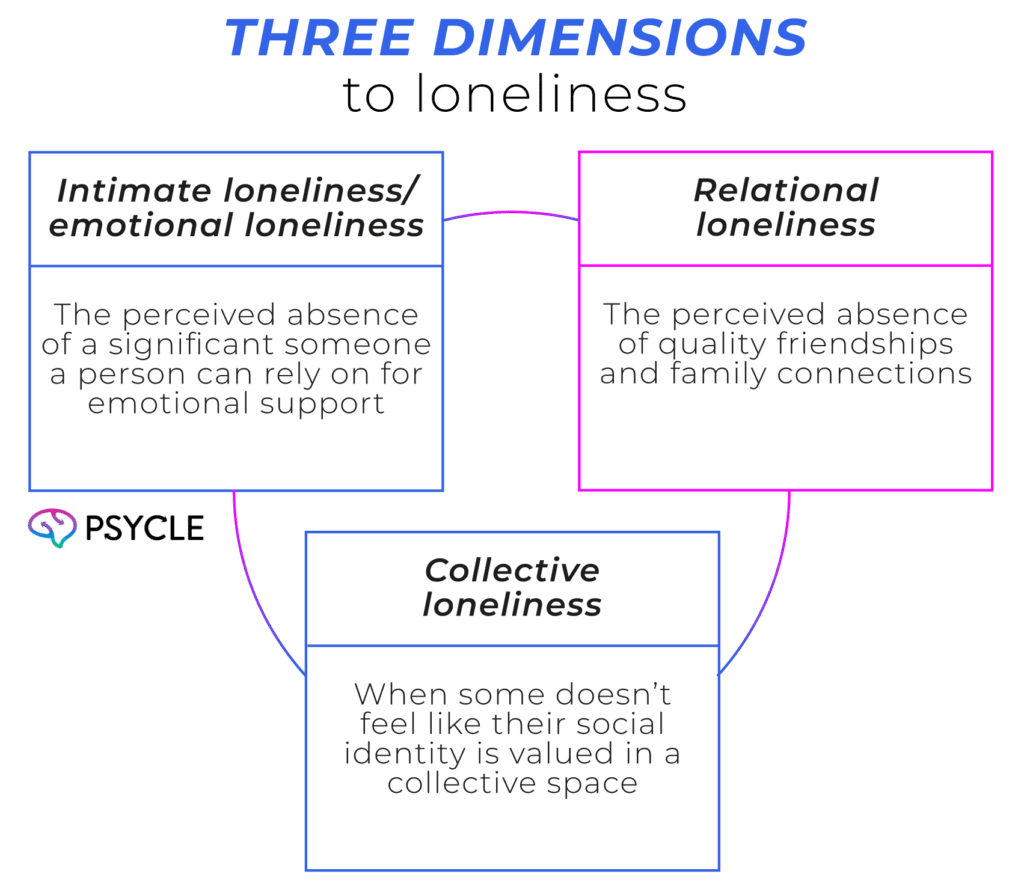Loneliness is a universal human experience that can cause deep emotional pain and discomfort. As social creatures, we have an inherent need for social connection and belonging, and when that need goes unmet, we experience loneliness.
This article will discuss loneliness and its psychological and biological impact. We’ll also outline how to cope if you are struggling with loneliness.
Key Takeaways
- Loneliness is a deeply distressing emotional experience that stems from our need for social connection.
- It can have significant psychological effects, including an increased risk of depression and anxiety.
- Loneliness also has a biological basis, triggering the release of stress hormones and impacting our physical health.
- Brain chemistry is influenced by loneliness, altering neurotransmitter levels and affecting mood.
- From an evolutionary perspective, loneliness serves as a signal to seek out social interaction and maintain relationships.
What is Loneliness?
Loneliness is defined as the state of distress or discomfort that results when one perceives a gap between one’s desires for social connection and actual experiences of it. This definition highlights the fact that feeling alone or lonely doesn’t necessarily mean being alone.
Stephanie Cacioppo and colleagues have identified three dimensions to loneliness. These include:
- Intimate loneliness/emotional loneliness – the perceived absence of a significant someone a person can rely on for emotional support
- Relational loneliness – the perceived absence of quality friendships and family connections
- Collective loneliness – when some don’t feel like their social identity is valued in a collective space

Loneliness tends to be more likely in populations who experience social isolation, such as older people who live alone or those with severe health and psychiatric conditions.
However, loneliness can affect everyone, and survey studies show it may be on the rise. The increase in loneliness may be influenced by digital technology, post-COVID effects, and long working hours.
Evolutionary Perspective on Loneliness
Loneliness can be seen as an evolutionary signal for social bonding. The need for social connection is deeply ingrained in our evolutionary history. Our ancestors relied on social bonds and cooperative relationships for survival. Feeling lonely served as a mechanism to motivate individuals to seek out social interaction and maintain relationships, ensuring their survival and the survival of the community.
Loneliness as a Human Condition
Loneliness isn’t just a human experience. Other social animals who have evolved to live in packs, such as whales, dolphins, dogs, and cattle, can also experience distress when socially isolated.
For instance, rats separated from their mothers during childhood show anxiety-like behaviors, increased aggression, and cognitive impairment, similar to neglected children.
Psychological Effects of Loneliness
The Impact of Loneliness on Well-being
Addressing loneliness and prioritizing social connections are essential for maintaining positive well-being. This involves addressing each dimension of loneliness–intimate, relational, and collective–as mentioned above.
One study investigating loneliness in adolescents from Scandinavian countries showed loneliness was a strong indicator of low well-being and self-esteem. Other studies have also found a relationship between perceived loneliness, life satisfaction, and psychological distress.
Loneliness and Depressive Symptoms
Loneliness has also been implicated as a major risk factor for mood disorders, notably depression. In older adults, the prolonged impact of loneliness is associated with an increase in depressive symptoms, such as persistent feelings of sadness and lost interest in activities. It has also been associated with an increased risk for suicidal ideation.
Loneliness and Executive Functioning
Executive functioning is the cognitive processes that enable individuals to manage and regulate their thoughts and actions to achieve goals. Loneliness can negatively impact these processes and is a risk factor for cognitive diseases such as Alzheimer’s, where executive functions become increasingly impaired over time.
Biological Basis of Loneliness
Brain Chemistry and Loneliness
Loneliness is associated with certain neurobiological changes. However, it’s difficult to know to what degree these changes are caused by loneliness or are pre-existing neurological variations that increase someone’s risk of experiencing loneliness.
Oxytocin is a hormone associated with social behavior and bonding. In one study, researchers found older people with less social support were more likely to have lower oxytocin levels and increased experiences of loneliness.
Another neurochemical affected by loneliness is dopamine–a chemical messenger responsible for pleasure and wakefulness. Researchers have found that social isolation in animals increases the activity of dopamine in pleasure centers of the brain. This may be a mechanistic response to compensate for loneliness. However, it could also increase the risk of impulsive pleasure–seeking and addiction.
Loneliness is also associated with a dysregulation in the hypothalamic-pituitary-adrenocortical axis (HPPA) – a set of structures responsible for regulating the body’s natural stress response. In turn, this can have negative impacts on the body and brain. For instance, HPPA dysregulation can compromise the body’s immune system, increasing the chance of infectious diseases.
Loneliness and Risk of Coronary Heart Disease
Loneliness is associated with an increased risk of heart disease through various physiological and behavioral mechanisms. This includes psychological stress, dysregulated inflammation, and increased blood pressure and heart rate. People experiencing loneliness may also be more prone to unhealthy lifestyle habits, such as poor diet and lack of physical exercise. These factors can all contribute to the risk of heart disease.
The Importance of Seeking Therapy
Overcoming loneliness can involve expanding one’s social circle as well as increasing the depth of pre-existing relationships. Identifying and overcoming any fears or blocks someone may have about meeting new people or forming deep and intimate connections is also essential and may require professional help (see below).
Some tools for overcoming loneliness can include:
- Making time to meet up with friends and family, for instance, arranging a phone call. Having shared experiences together can also increase bonding.
- Using socializing apps and websites such as Meetup to connect with people who share common interests in your area
- Finding local volunteering opportunities and joining activity clubs (such as fitness groups, choirs, book clubs, etc.) as a way to meet people
- Self-care practices such as yoga and exercise to help you manage feelings of loneliness better and improve wellbeing
Seeking Professional Help
Therapy offers a non-judgmental and confidential environment where individuals can freely express their feelings and concerns related to loneliness. Having a therapist who listens actively and provides empathetic support can significantly alleviate the emotional burden of loneliness and provide a sense of validation and understanding.
A therapist can also provide tailored guidance and support to help people understand the root causes of their loneliness and identify any barriers someone may have to meeting new people or forming quality intimate relationships.
It is important to note that therapy is not a one-size-fits-all solution, and finding the right therapist may require some exploration. Individuals should consider seeking therapists who specialize in loneliness and relationships. Online directories and resources, as well as recommendations from trusted sources, can help find qualified therapists who align with individual needs and preferences.
Online therapy sites like Brightside offer a free mental health assessment. Just complete their 4-minute questionnaire, and you’ll get a personalized treatment plan and an appointment for a virtual session with a professional in less than 48 hours.
Conclusion
Loneliness is a complex and multifaceted experience that can cause significant pain and distress. It stems from our inherent need for social connection, and when we lack meaningful relationships, we experience feelings of isolation and hurt.
Understanding the psychological, biological, and evolutionary factors behind loneliness helps shed light on its impact on our well-being. Active and intentional coping strategies are also essential in managing loneliness.
Engaging in activities and hobbies that foster social interaction, joining social support groups, or participating in community events can help alleviate feelings of isolation and promote a sense of connection. By actively addressing and coping with loneliness, we can improve our overall quality of life and well-being.
FAQs
What is Loneliness as a Human Condition?
Loneliness is a fundamental aspect of the human condition. We are social creatures with an innate need for social connection and belonging. When we lack meaningful relationships and feel isolated, we experience loneliness, which can be distressing and impact our overall well-being.
How Does Loneliness Affect Brain Chemistry?
Loneliness affects our brain chemistry by altering the levels of neurotransmitters. Social isolation can lead to decreased levels of serotonin, which regulates mood, contributing to feelings of depression and anxiety. Loneliness also impacts dopamine, the neurotransmitter associated with pleasure and reward.
How is Loneliness Associated With Depressive Symptoms?
Loneliness is strongly associated with depressive symptoms. Social isolation, weak social connections, and overall loneliness are independently linked to an increased risk of experiencing depressive symptoms. Loneliness can amplify feelings of sadness, despair, and low self-esteem, contributing to the development of depression.
How Can We Cope With Loneliness?
It is essential to address and cope with loneliness to mitigate its negative impact on our well-being. Building and maintaining social connections, engaging in activities that foster social interaction, seeking professional help through therapy, and joining social support groups can all be effective strategies in coping with loneliness.

